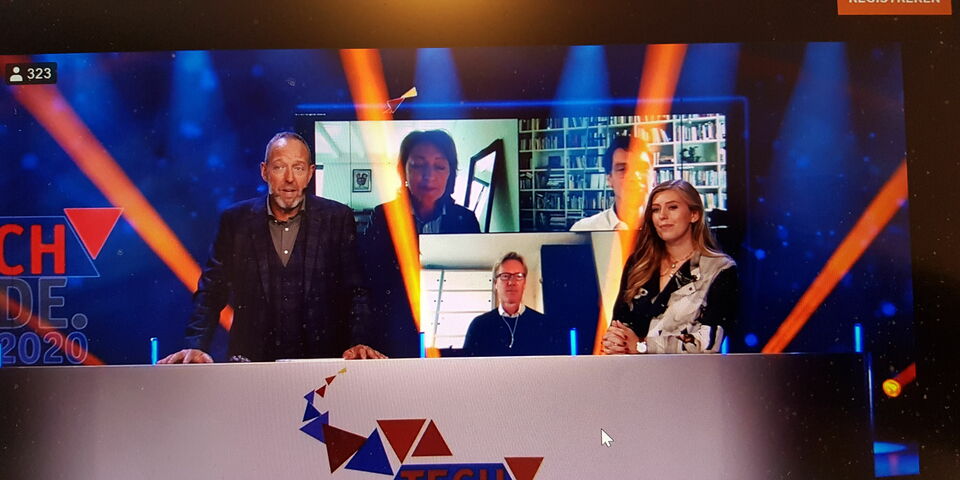The first Techrede is a fact, but addressed to whom?
Dots on the horizon, the power of innovation, visions for 2050, and the position of the Netherlands on the Global Innovation Index. All this was discussed yesterday in Studio21 in Hilversum, where the four universities of technology presented their first Techrede address. This equivalent of the Troonrede was spoken by four TU students during a carefully directed live virtual event. At its peak, 350 viewers watched the livestream. But for whom was it actually intended?
The setting in which four TU students, including Carijn Mulder from Eindhoven, presented their live Techrede address yesterday afternoon from a studio in Hilversum in no way resembled the stately Ridderzaal, where the king normally holds his Troonrede. It looked more like a slick company presentation, with much use of images, light effects and swiftly changing camera angles, interspersed with music from the movie Inception. According to Louise Fresco, president of the executive board of Wageningen University, the organization deliberate opted for young people “who are currently still involved with technology,” instead of “boring bigwigs.”
The event and the talk show that followed were presented by actor Harry Piekema, better known as the supermarket manager from the Albert Heijn commercials. Piekema touched on a wide range of issues in rapid tempo, including the handling of the corona crisis, energy transition, climate problems, and the developments in the field of agrifood. He asked Fresco about the importance of innovation with regard to these issues, and about the role of the four TUs in this. Don’t stay focused on past successes, but continue to innovate, was Fresco’s obvious answer.
Flood of 1953
The message from the Techrede was clear: the Netherlands needs to continue to stimulate and facilitate innovation. Only with innovations can the current global challenges, and those facing the Netherlands, be solved. As a country of knowledge, the Netherlands must continue to play a key role in this. Also because of the economic interests involved.
The students made comparisons between the current crisis and the flood of 1953 (Waternoodsramp), when the Netherlands also tackled problems with an enormous effort and much speed, and started to make plans for the future. Terms such as Deltaplan 2.0, dots on the horizon, and a vision for the year 2050 could be heard regularly. Carbon-neutral flying and driving, better and more cost-efficient healthcare, smarter and cleaner agriculture and livestock farming; everything was touched upon in a fluent argument from the four students. Mulder, former team manager of Solar Team Eindhoven 2019, even managed to find an opportunity to promote solar car Lightyear.
It was emphasized that the science students don’t intend to tackle these problems on their own. Cooperation must be sought with scientists from other disciplines, such as behavioral scientists and ethicists.
Cooperating with Germany
The talk show that followed was high-paced as well. Discussion partners Ineke Dezentjé (president of FME), economist Coen Teulings, innovation scientist Marko Hekkert and Beatrix Bos, TU/e Master’s student and former member of Solar Team Eindhoven, were hardly allowed by Piekema to finish their answers. Dezentjé pointed out that the Netherlands should strive for a higher position on the Global Innovation Index – on which it currently occupies fifth place – if it wants to become a more attractive partner for other countries and function “as a magnet for talent from abroad” as optimally as possible. She also made a plea for more cooperation with Germany in the field of innovation. “Germany might be ranked lower on Global Innovation Index, but cooperating with this partner country strengthens the competitiveness of both our nations.”
Economist Coen Teulings from Utrecht mostly stressed the importance of excellence and ambition with regard to knowledge development. “Strive for the best of the best,” was his message. Marko Hekkert had his doubts whether innovation can help the Netherlands emerge from the current crisis. “It would seem better to me if we start to prepare for the next crisis.” TU/e student Bos believed that consumer demand and supply should converge more in the future. She also pointed out to the other discussion partners that questions about ethics and the possible impact of research have been an integral part of the TU/e curriculum for years.
Political agenda
The Techrede address was announced as an appeal to political leaders in The Hague to make technological innovations an even more structural part of their agendas. The question, however, is for whom exactly the Techrede was intended: for politicians, for their constituency, for young people, or for the Dutch public in general?
The fact is that the event, in which the four TUs undoubtedly invested heavily, was seen live by only 350 people yesterday. In a thank you mail to those who were present, the organizers say that they nevertheless look back on a very successful afternoon.



Discussion